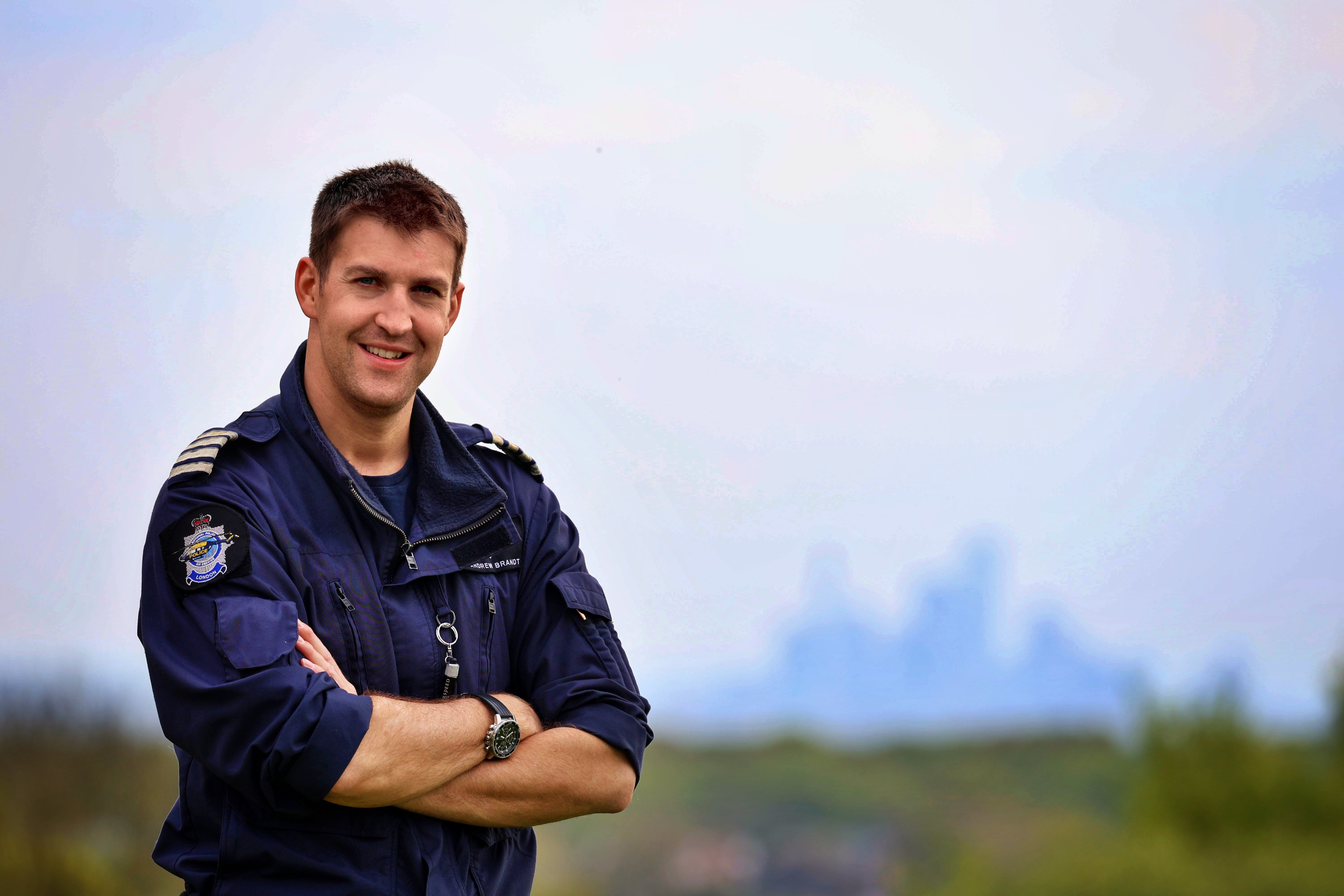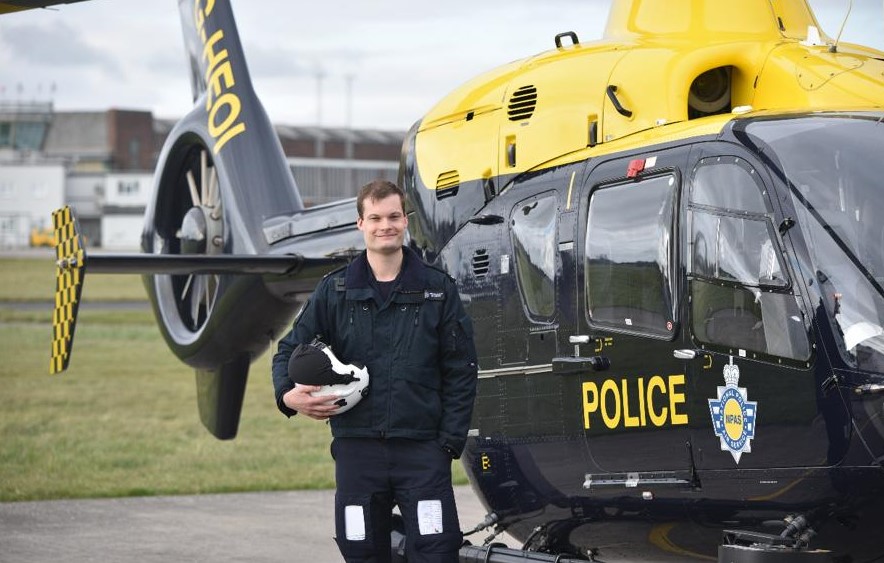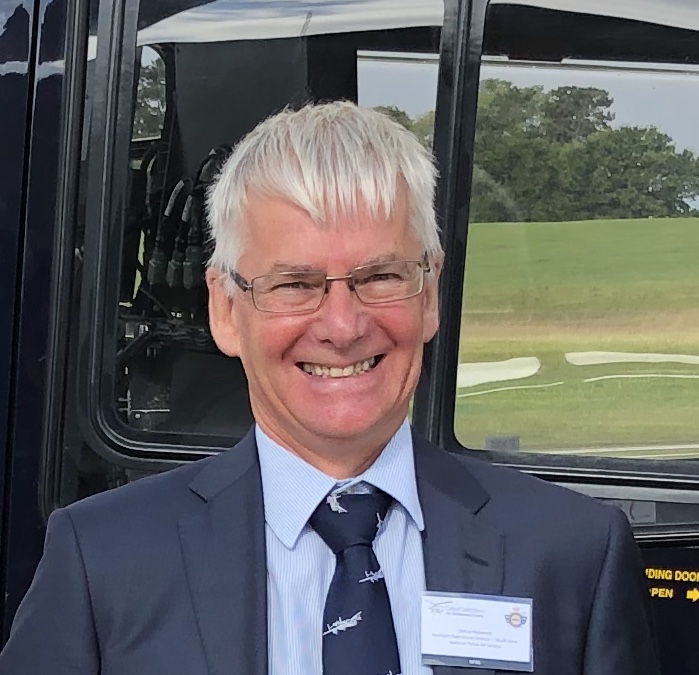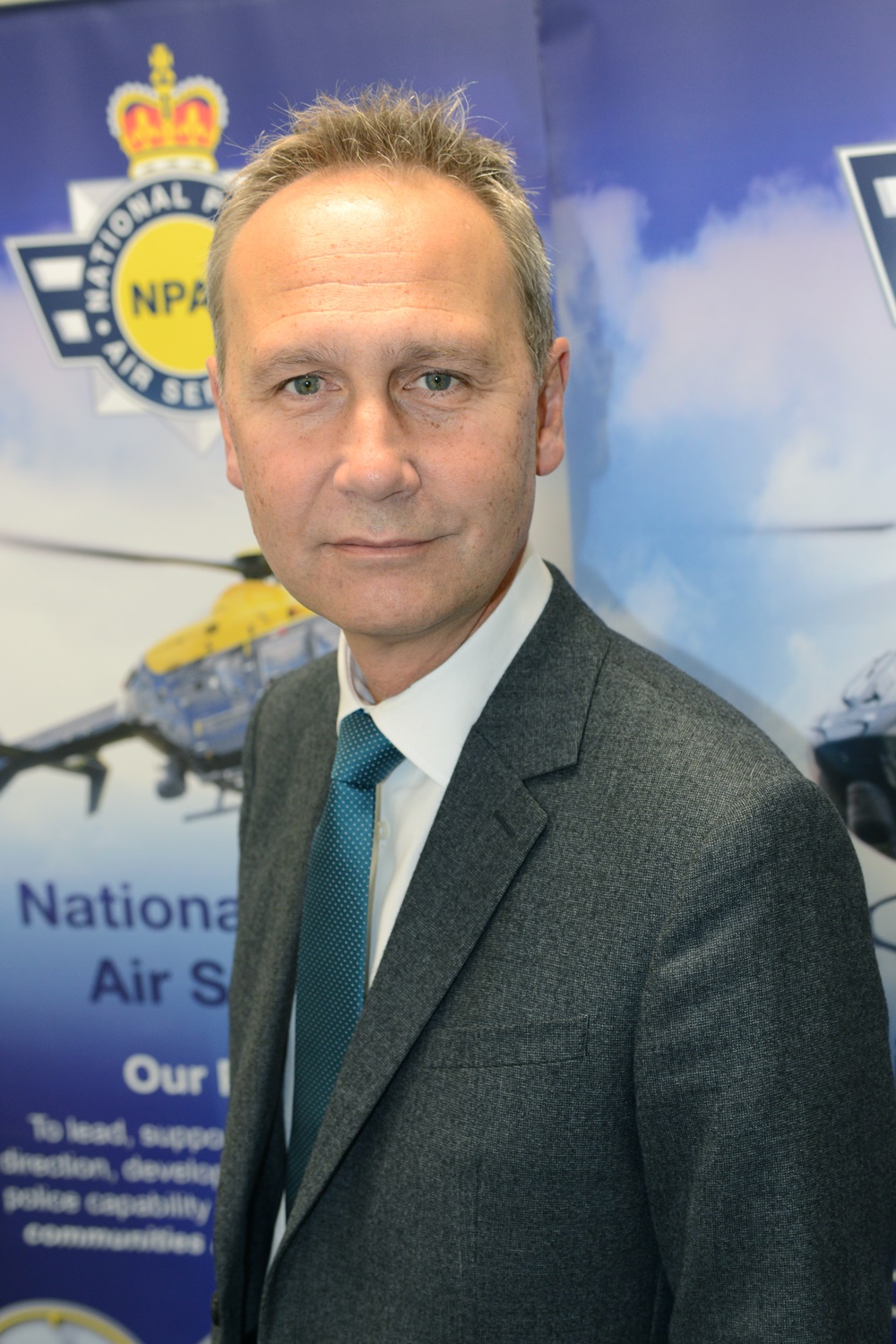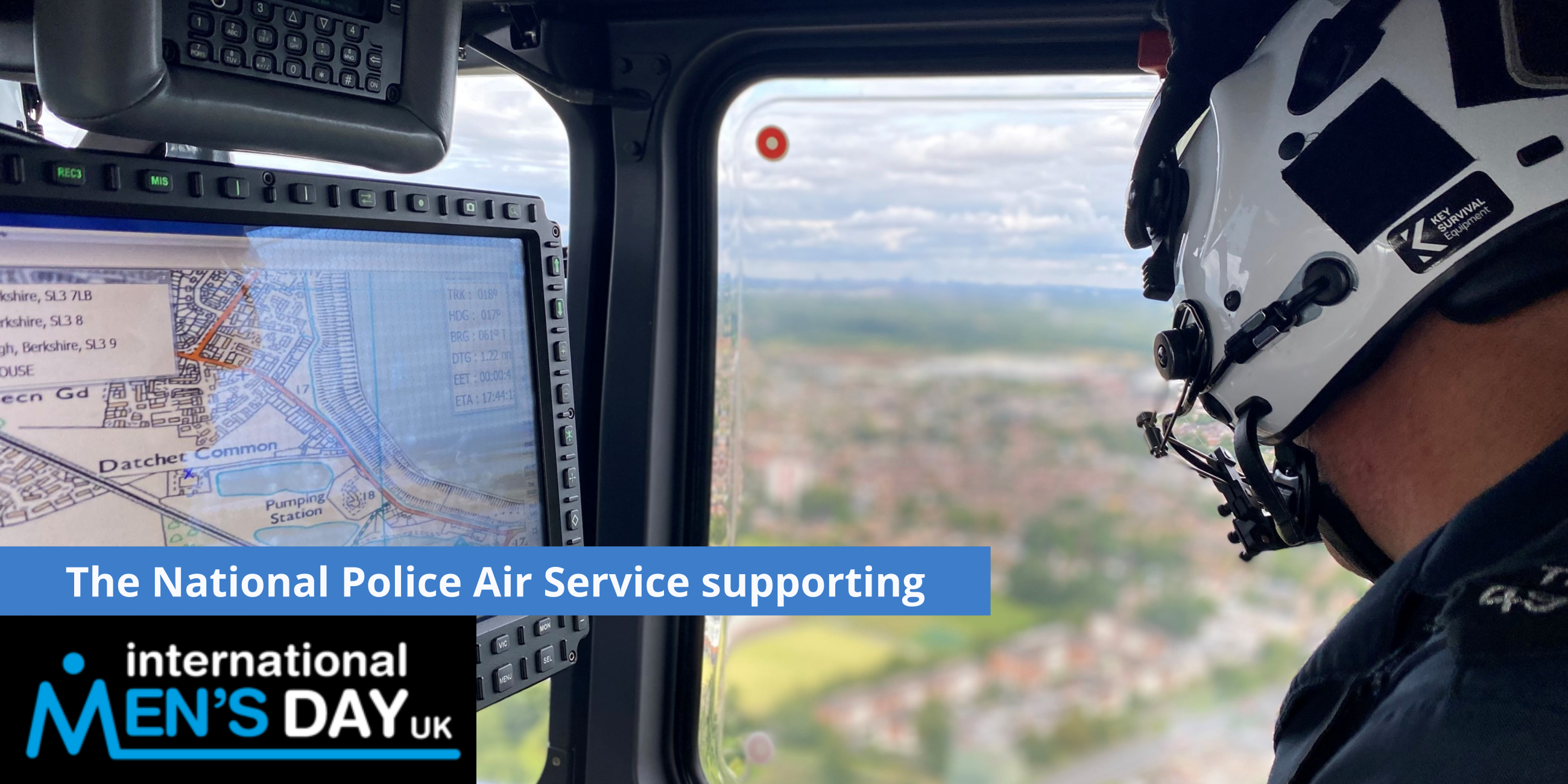Meet some of the team this International Men's Day
Sunday 19 November 2023
Ever wondered what motivates a member of the National Police Air Service to do the job they do - saving lives and tackling criminality from the air?
This International Men's Day, we took five minutes to chat to some of our dedicated staff who love what they do, knowing that it makes a difference to so many lives and communities.
Meet our Tactical Flight Officer Mike
Mike is a Police Constable and is a member of one of the NPAS crews covering the North West.
He describes his job, quite simply, as 'helping officers on the ground, targeting criminals, finding vulnerable missing people and providing, all importantly, evidential footage for court proceedings and investigations'.
The job doesn't come without its challenges - poor weather resulting in challenging flying conditions and not having more aircraft to provide an even better service are just two frustrations - but Mike's motivation comes from knowing that the support he, and his crew mates, give to colleagues doing a really difficult job on the ground, helps to keep them, and the public, safer.
"Teamwork is everything. From inside the aircraft, to back on the ground at our base, without working as a team we couldn't do the job and provide the service we do," said Mike.
"We rely on each other, our training, our experience and our colleagues on the ground, to do the very best job we can, every time.
"The true value of air support cannot be quantified.
"The time, money and resources that air support truly saves far outweighs anything else. I know I always felt safer when I was back in my policing area and the helicopter was above us."
And his message to any ground-based colleagues who might be tempted to apply for a role in the National Police Air Service?
"Go for it!.
"It is one of the most difficult recruitment and training processes you will ever go through. But the rewards are more than worth it. Give us a call or email. We are always happy to have a chat to police colleagues about recruitment.
Hear from Andrew, one of our pilots
Andrew works with the crews at NPAS London, covering a diverse range of taskings for The Metropolitan Police Service.
Flying over the capital city, and all highly populated areas, comes with huge responsibility, especially when our crews are tasked to fly at night or at low heights. All our pilots are highly skilled and experienced and some of the best in the business.
In a nutshell, Andrew's job is to safely and efficiently position the helicopter in the sky, with its usual crew of three, to support police officers on the ground.
A good day for Andrew is when the crew has made a positive impact to the community, be it locating or assisting a vulnerable person or successfully helping to apprehend a suspect, especially if they are actively trying to evade the police.
There are occasions when pilots will land, when it is safe to do so, for the officers on board to administer first aid, deliver vital equipment, such as stretchers or defibrillators to colleagues, transport stricken people or even, on occasion, arrest a suspect.
"Using the equipment onboard, we can locate suspects that would otherwise evade the law, we provide an airborne view to aid management of large public events, we can follow a vehicle, reducing risk to the public during a pursuit, and can land to provide assistance to the emergency services when required.
But for the pilot, it is the safety of everyone, in the air and on the ground, that is the number one priority.
"We operate in the busy airspace over London, so I have to work closely with Air Traffic Control to coordinate where we want to go, so they can safely keep other aircraft and helicopters a safe distance away, without causing major disruption," he explained.
"Add in the challenges of an ever-changing city skyline, with new buildings and cranes popping up regularly, plus the unreliability of the British weather, and it makes for an interesting operating environment."
Like everyone at NPAS, its the team, and making a difference to people's lives, that is Andrew's motivation.
"I work with a fantastic set of colleagues, who are all motivated to provide the best possible service to the emergency services," he said.
"I get paid to fly a highly manoeuvrable, sophisticated helicopter over the capital city, helping catching criminals and assisting to save lives. Also, the view from the office is pretty awesome.
"I love the dynamic, unpredictable nature of the role. The type of flying we do is unlike any other. You come to work, no two days are the same, and I value the satisfaction we get from ‘a job well done’ at the end of a successful flight.
"The support we provide to the public is only possible by each member of the crew seamlessly working together, each with their own role and responsibility. We have to clearly communicate to each other, on what task we are performing, and how we need to position the helicopter to achieve this, using all of the role equipment we have onboard.
"We can only provide effective air support if each member of the crew is performing to the best of their ability. I can follow a speeding car or motorbike by flying the helicopter, but it requires the camera operator to keep tracking the vehicle, and the rear crew member to be able to communicate to officers on the ground in order for us to be of any value.
Jeff is a Tactical Flight Officer in the South West and Wales region
At the heart of every tasking is people. That's why Jeff and his NPAS colleagues come to work every day.
"I get the most job satisfaction when we find the most vulnerable people in society, whether it be missing children or elderly people" said Jeff.
"We recently had a good job in Gloucestershire where we found a missing elderly man. We were able to land in order to get him back to his family, having been missing for almost six hours in the most horrendous weather.
"As a tactical flight officer, my motivation to come to work every day stems from a deep commitment to public safety and a strong sense of duty. I find fulfilment in the knowledge that my role can directly contribute to the safety and security of our community, and the opportunity to make a positive impact through my specialised skills and expertise."
We are lucky to have people like Jeff working for NPAS.
The purpose of air support is to protect communities and tackle criminality but the delivery of it is complex and highly specialised.
"A tactical flight officer is a specialist role within the police. The TFO works in tandem with a pilot in airborne policing operations. My role involves operating and managing the tactical equipment and systems on board the aircraft, providing situational awareness, and assisting in various law enforcement missions.
"One of our biggest challenges is the need to effectively multitask and maintain situational awareness while operating complex equipment and systems aboard an aircraft. Balancing communication, navigation, surveillance, and assisting with the mission, can be demanding, requiring good coordination and adaptability.
"Police helicopters and aeroplanes offer significant value to law enforcement agencies by providing aerial support for a wide range of critical operations. They enhance public safety through capabilities like pursuit and surveillance, search and rescue, traffic monitoring, and crime scene documentation, offering a unique perspective and aiding in faster response times and more efficient policing. Additionally, their visibility can act as a deterrent to criminal activity, contributing to overall community safety.
Say hello to Simon, who works in projects
It takes a raft of specialist staff, with a diverse range of skills and experience, from safety management, financial planning, compliance auditing and logistics to operational dispatching and maintenance, to keep our aircraft and service safe, operational and effective.
One behind-the-scenes, but critical, role is played by our Projects Team, whose job it is to make sure the best possible equipment is installed in our aircraft, subject to capital funding from the Home Office.
Simon is a Project Manager who works with our partners and suppliers to make sure all our priorities are aligned.
Most of his tasks rely on specialist knowledge to deliver some very complex project work.
"That means working very closely with a great many people who really know their stuff," he said.
Having himself worked in police aviation for many years, Simon values the quality of expertise employed by the service.
"The people within NPAS have years of experience, and really know how to provide the best-value service that forces, and ultimately the public, really need, when they most need it.
"There is this misbelief that air support is expensive. If that is what you think, then think of the cost of those lives that are saved every day because of the work of the National Police Air Service."
This is Russ, one of our two Regional Operations Managers
The link between our air operations and the police forces we serve is critical if we are to make maximum impact on community safety.
Key to those relationships are our northern and southern based Regional Operations Managers.
Russ has the job of overseeing operational delivery for all our bases in the southern regions.
Delivering for forces is a priority.
"I know I have had a good day when I see great results for local police forces," said Russ.
"And this is every day.
"Our crews make a tangible and positive difference to policing and communities."
Like much of policing, working within the challenges of limited resources means that every single person's contribution matters.
"Teamwork is as fundamental to air support as safety. It simply doesn't work without effective teams. As such a lean organisation, we literally rely on everyone to do the very best job - and they do. Working with such talented and highly motivated people makes all our jobs easier.
"I've been in police aviation for nearly 28 years and I'm still impressed at the quality of the results we bring to forces. It motivates me every single day."
And Russ's final word?
"NPAS is about mitigating the very highest risk incidents for local forces and communities.
"We make a tangible and positive impact on serious crime and public safety that simply can't be done any other way."


